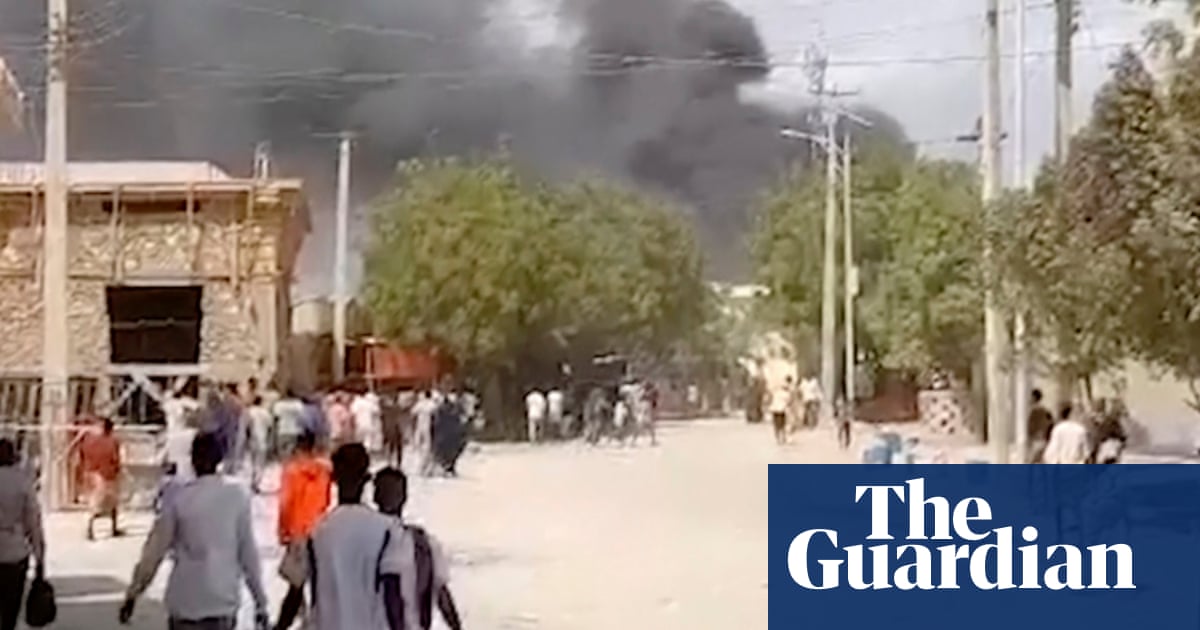
s a ghostly brown haze began to clear, the streets of east Beirut emerged in apocalyptic ruin. Even 4km from the centre of the blast each building had lost some, if not all, of its windows. It was just after 6pm. Smoke, dispersed with pockets of pink gas, shrouded some of the carnage. Huge shards of glass covered roads – some jagged pieces had ripped through cars. Trees were shredded, and pools of blood formed puddles in the streets.
Blood trails led to the cars and motorbikes that had sped the injured away to clinics or hospitals, which within minutes of the explosion were struggling to cope with the number of dead and injured.
Ambulances wailed along the city’s boulevards, speeding past intersections gridlocked by the sheer numbers of cars trying to flee and the weight of hazards they had to pass. The mushroom cloud that had billowed over the nearby port was being pushed to the east, but it towered in some form for almost half an hour.
Walking down through the east Beirut suburb of Ashrafieh to Gemmayze and towards the site of the blast at the port, the devastation was even more comprehensive. Dozens of buildings had clearly sustained structural damage. Shops, and restaurants were almost all severely damaged. A whole nightclub district was virtually wiped out. Weeks of sustained artillery shelling had not caused the same amount of ruin, even during the peak of the civil war.
Men, women and children were walking, bewildered, from somewhere near the blast site. Few were hurrying. Many were abandoning what remained of their homes, heading for nowhere in particular. It was just as difficult to get past the debris on foot as it was by car.
It takes a lot to shake Beirut, which has risen and fallen under bombs before. But in a city inured to explosion, this was something new. An economic implosion had left a country on edge. Now a devastating explosion of a dimension that few could comprehend. “We’re cursed,” said one man, in his early 20s, blood streaming down his wrist from a glass cut. “Even if this was an accident, it’s the last thing we could afford.”
The last time a blast anywhere near this size had rocked Lebanon was in February 2005, when the former prime minister Rafik Hariri was killed by a car bomb outside a waterfront hotel. More than 15 years later, a result in the trial of his accused killers is due in The Hague on Friday, and there were fears the explosion could be a harbinger of the verdict.
“Nothing happens without a reason here,” said Sobhi Shattar, as he swept debris from the front of the former Nissan chief Carlos Ghosn’s house in a well-to-do street. “This could be a message for everyone to back off.”
The focus quickly became what had blown up and how, with everybody having a theory. The blast wave was felt as far away as south Beirut, and was heard 80km (50 miles) away in northern Lebanon. There were reports that the sound of the explosion was heard 250km (160 miles) to the west in Cyprus.
“Only huge quantities of high explosives could do that,” said Riyadh Haddad, a local engineer. “Something at the port either blew up by itself, or got targeted.”
Like his neighbours in the entertainment district of Gemmayze, Haddad had a lot of work to do to make his house habitable. “Look at it,” he said. “How do we recover? There are at least 1m windows missing across the city, and that’s the least of our worries. No money, jobs, power, fuel. And now this. Will it be a wake-up call, or will there be a war?”
In the early aftermath, Lebanese officials were blaming the chaos on a storage of fireworks igniting in a catastrophic accident. That version was debunked by the sheer size of the explosion and reach of the blast wave.
The Interior minister, Mohamed Fehmi, later told the MTV Lebanon channel that the explosion appeared to have been caused by “huge quantities of ammonium nitrate” being stored at the port. But the announcement was not enough to put an end to rampant speculation.
“Was this a weapons storage centre?” asked one man, frantically trying to phone his friends. “Did the Israelis hit it? There was a small explosion, then a bigger one. What caused the first?”
Rumour and intrigue spread as fast as the shockwave, and by nightfall, Lebanon’s security chief, Gen Abbas Ibrahim, had debunked the fireworks theory and blamed an industrial accident in a warehouse depot, which he said had housed highly combustible chemicals.
Not everyone was convinced. “In all the history of Lebanon, there has never been anything like this,” said another man, in his 30s, as he swept glass out his front door. “This was almost thermonuclear, and I think it was a lot of military-grade explosives that went up. Will they ever be truthful about it? I doubt it.”
As night closed in, Beirut was darker than ever. The waning electricity that recently could barely keep the city going was barely needed, for once. The city was rapidly emptying. The lights were no longer on.












